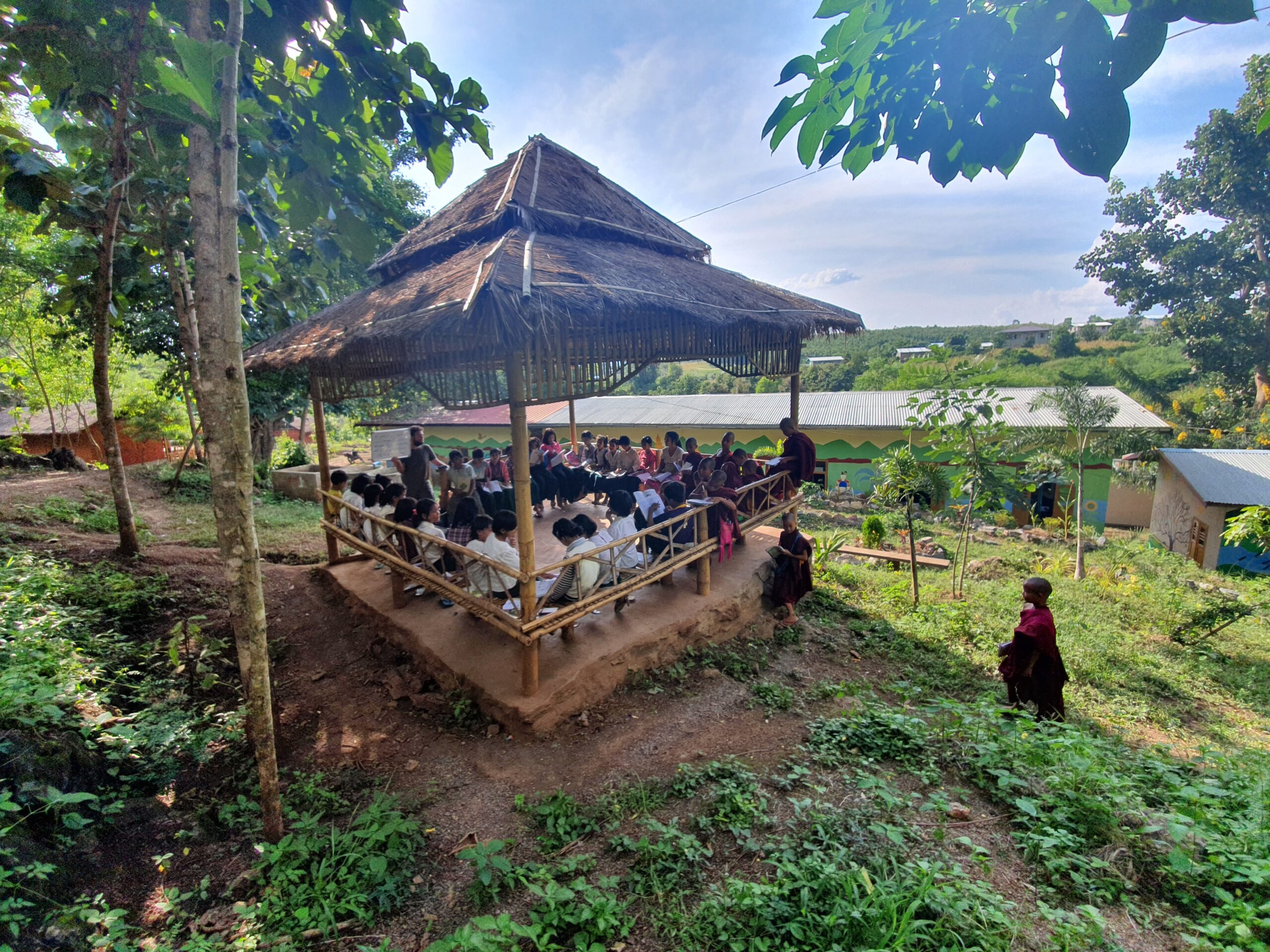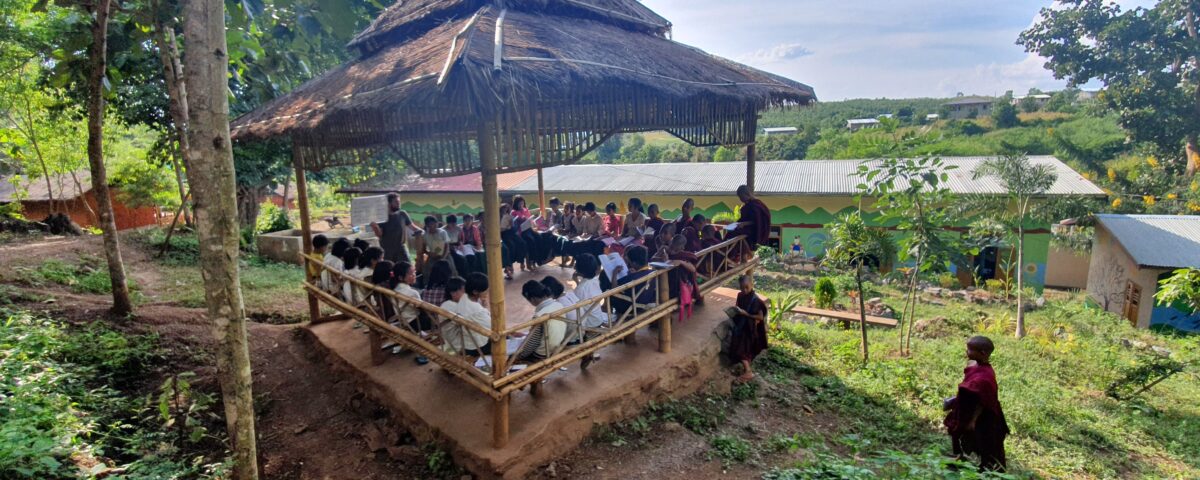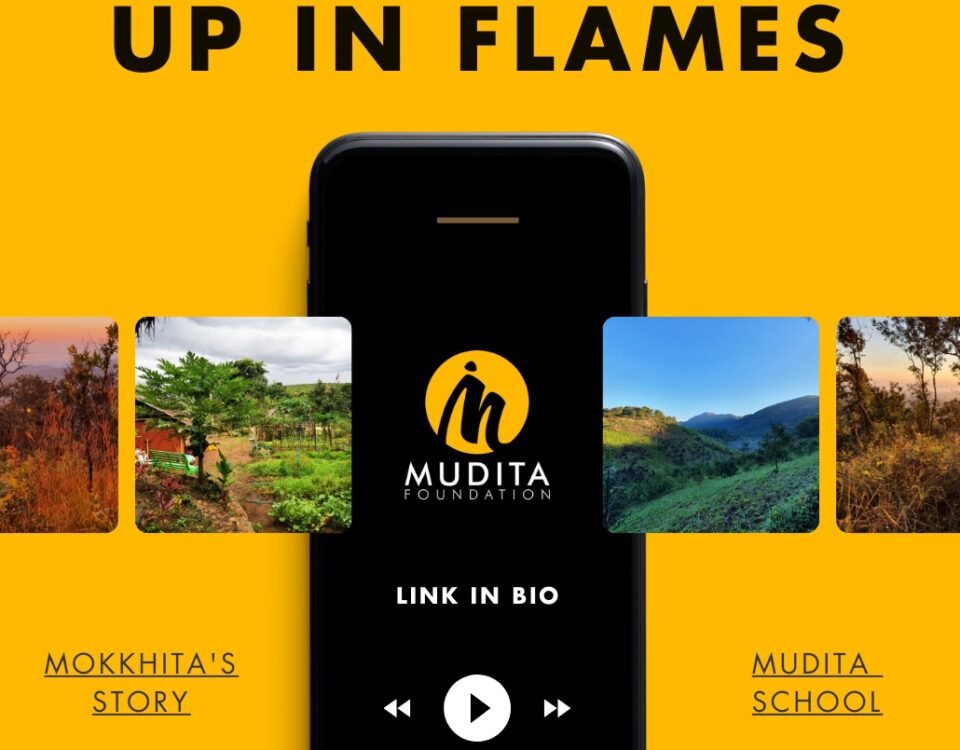Lillis STORY
Today, we share Lily’s story, who was a volunteer at Mudita School for 19 months, the longest and most influential volunteer we’ve ever had, and Lily was with us until the end.
 Everything started with the elections in November 2020, opposing the NLD (Aung San Suu Ky’si party) and the army-backed USDP party, basically the only party of opposition. The government requisitioned teachers everywhere in Myanmar to help to organise the elections. Htet Eain Gu monastery was transformed to an electoral office and the local teachers helped to prepare the place, following very strict rules (concerning Covid and the election security itself). Everything seems to be a fair and controlled election. The army didn’t accept the landslide victory of the NLD with more than 80% with the risk of losing this time too much of their power and control over the country.
Everything started with the elections in November 2020, opposing the NLD (Aung San Suu Ky’si party) and the army-backed USDP party, basically the only party of opposition. The government requisitioned teachers everywhere in Myanmar to help to organise the elections. Htet Eain Gu monastery was transformed to an electoral office and the local teachers helped to prepare the place, following very strict rules (concerning Covid and the election security itself). Everything seems to be a fair and controlled election. The army didn’t accept the landslide victory of the NLD with more than 80% with the risk of losing this time too much of their power and control over the country.
People around me have already started to talk about the possibility of a military coup, fearing this eventuality in the near future. But at this time nobody wanted to believe it. The army claimed fraud but the Myanmar election commission rejected the military’s claim and said that there were no signs of irregularities. The army never brought any evidence of irregularities either. The 1st of February, all ways of communication were shutting down completely: no radio, no TV, no internet, no data. Everybody was tense, with the feeling that something was going on. That day was also the day the new government should form the new parliament so people were suspicious. In the afternoon finally the internet came back… and the terrible news came out: the military took back power and arrested main members of the new elected government. Some people were crying, already measuring the consequences. Burmese experienced dictatorship in the past, for so long already…
Every evening, at 8pm, everywhere in Myanmar, people were meeting together in their house, balcony or backyard and listening to democracy songs, banging pots together. During those moments I could feel how strong their determination was already and I had the feeling to touch just from the very extremity of the finger, a bit of how heavy and painful was for them the weight of the past. Then demonstrations started, everywhere, including in Nyaung Shwe.
There were children, teachers, lawyers, nurses, students, old people… Everything was well organized, at the end of the cortege people were even picking up things to keep the place clean. There was a strong solidarity between locals; some people were distributing food and drinks to the protesters. Everything was quite calm at first; the police were almost invisible at the beginning. Then slowly things went off in another direction.
In Nyaung Shwe as well, things started to change. At night, during the curfew starting at 8pm, some military trucks were patrolling in town, and a re-enforcement of 150 soldiers in town was in place. And one day, the soldiers from Nyaung Shwe received the authorization to shoot with real fire bullets like in other places already in the country. During the night from the Monastery we could hear the shooting guns from town in order to scare the population. People living in the city centre couldn’t sleep anymore; they were too scared. Day after day demonstrations in Nyaung Shwe became more and more difficult, with fewer and fewer protesters who had from now to face armed soldiers. One day in Taunggyi, one independent Polish journalist was beaten badly by the military and arrested (he stayed around 2 weeks in jail next to Kalaw). Today, there are NO official independent journalists who can still report what is happening there, they all have been arrested, intimidated or worse.
At Mudita, things became very tense as well. Some projects similar to Mudita were already forced to close at this time. Some leaders from organisations were arrested or on the run wanted by police. Thus today, almost if that’s not all NGOs were forced to close.
One day, there were 3 trucks which came to the monastery, military and police, they asked the names of everybody who were staying at this place and asked who wanted to get vaccination against Covid-19. One evening, one military truck was parked at the beginning of the small road leading to the village and monastery. Knowing that there were a lot of night raids in which the military arrested people arbitrarily, everybody was scared that would also happen in our monastery.
We stayed as long as we could at Mudita until that night… Around 8pm there was electricity shut down for a few minutes (8pm is the time when normally people banged pots). Then later I heard trucks coming and going, what looked like fire guns or small detonations, people shouting and I saw a huge fire: The “Bamboo Garden” (Mudita’s restaurant, the first Building, located just on your right after the bridge) was burning. The flames were so high and spread so fast, the sky in front of me was all orange with small particles dancing into the air. I went to the forest to hide in case the military were still around and I contacted other people on the phone to know if they were ok and what was happening. I was walking in the dark trying not to use any light to remain discreet but the night was clear enough to see. I will never forget this orange colour in the sky and the deafening stillness and silence of the forest contrasting with the turmoil of what was happening not far from there. Most of the teachers were still around the main school and didn’t look so scared about the police or military danger, only 2 teachers and Mokkhita were also hiding together in the forest. I joined them a few hours later. The military came back to the monastery and said that the managers of the place have to come the day after before 9am at the police station of Nyaung Shwe to sign a paper to take all the responsibility of what they called a simple forest fire (while only one building burnt, not the forest around…) and they asked the villagers to take off and clean everything next early morning (probably in order to make disappearing any proofs of the fire). It became much too risky for anyone to stay there and the project was closed on that night of chaos.
It was terrible to leave like that in the middle of the night, saying goodbye to only a few teachers, in a hurry and confusion, taking the motorbikes and driving in the dark hoping not to meet any military on the way especially during this curfew period. I was so scared for the other teachers who were still at the monastery when I left with one teacher and Mokkhita. I have learned later that even some of them stayed for one or two more days there. That could be really dangerous as the military can arrest anyone anytime without following any rules. As it happened in similar stories, when the military can’t arrest the leaders, they arrest other people instead, people connected to that same organisation. Hopefully, thanks to life, nobody got arrested and finally almost all the Mudita teachers left sooner or later.
On the way to Yangon, we passed many military trucks full of material probably stolen from the villages around or even sometimes with prisoners in the back. After a lot of military checkpoints, a lot of tears, with this feeling of floating in a nightmare, we finally reached a town transformed into a big battlefield. From that point I’ve heard a lot of contradictory stories connected to the monastery. The Sayadaw U Sandima* (the abbot of the monastery) came the next morning after the fire and said first that the leading teacher and Mokkhita did not have to be afraid to go to the police station in Nyaung Shwe. He encouraged them to go to the police and said that he would guarantee their safety. But just a few hours later he said the opposite, that the police were looking after them to arrest them. The day after the fire, straight away, some teachers who were still there have witnessed Vaipulya** and Thumingala*** breaking all the locks swiftly from Mudita’s buildings and collecting all valuables.
*Sayadaw U Sandima: Is the Abbot of the monastic school, but he was rarely coming at the monastery, I think I only met him two times during this 1 and a half year I was there. What I knew about him was that he was supporting the military and was an active member of the “Ma Ba Tha” (also called “Association for the Protection of Race and Religion”), which is an ultra-nationalist Buddhist organization. This organization is inciting violence by giving hate speech and is responsible for deadly communal violence against Muslim. Even if the government of Aung San Suu Kyi tried to ban this organization, the group was still going on in other ways and continued to receive cash donations and support from military figures.
**Vaipulya: is a Chinese novice monk who came in 2020 as Volunteer helper to the school. At this time his name was Mingde. Mokkhita ordained him as a novice monk and trained him in the monastic disciplines. He helped in the project and meditated.
***Thumingala: is a Burmese Monk who is living in the monastery. He is responsible of the novice’s religious education.
They told everyone that Mokkhita and the leading teacher were criminals who abandoned everything for what was just a fire and didn’t take their responsibility. And they asked them to immediately send the car keys and the bank book and to not come back because the police will arrest them. They also sent the computers for “reparation” (even if all of them were working perfectly), probably to sell them out. Vaipulya even wrote and asked help to translate a letter addressed to the court to warn about Mokkhita and the leading teacher which in this political context, this kind of actions could simply have led to very serious or even fatal consequences.
The school in Htet Eain Gu monastery is opening again now, welcoming hundreds of students. Unable to find enough teachers, some students become teachers themselves. In Myanmar, the military stated an “official” school reopening date on June 1st. But officially, more than 125 000 (on a total of 430 000) school teachers have been suspended by the military for their participation in the CDM (Civil Disobedience Movement) and more than half of the teachers are on strike. And between the opposition to the regime and the parents who feared sending their kids in this context of military violence occurring everywhere it would be a total of some 90 percent of Myanmar students who are not attending school under this military regime.
Everywhere in Myanmar, people continue to fight for democracy. In Yangon it looks like a war zone. We could think that the violence happened only in some places, especially in big cities but the truth is that nowhere is safe in the country anymore. In Yangon, some locals prefer to crawl in their own apartment to avoid receiving a fire bullet through the windows!
Over 800 persons died since the 1st of February, more than 4000 persons remained under detention and numbers might be much more important in reality as abductions, torture, disappearance are becoming common. Most of the workers are on strike or lost their jobs, there are no medical place anymore to cure the people or so little (they were the target of military as well), banks are very restricted with a 10% fees on each withdrawal to avoid bank collapse while the kyat is falling apart, the currency has already lost 20% of its value since the military coup. Every evening on the Army’s TV Channel they announced the new list of the people they want to arrest, 20 medical workers plus other civilians, famous actors, artists or writers. Every day, people are afraid to see their own name appearing on the screen. ANYBODY can be arrested, the law is dead.
I feel so sad for those incredible people who only have the chance to experience a few years of an idea of democracy, before being put back down in darkness. I believe that we don’t talk enough about what is happening there in our Occidental countries. So please please please… share about Myanmar with people around you as much as you can, as far as you can.
Lily.


